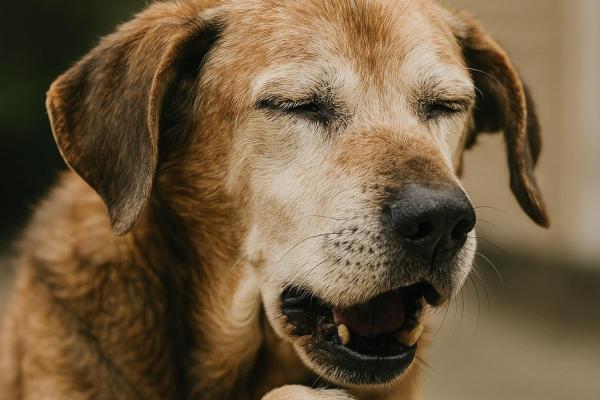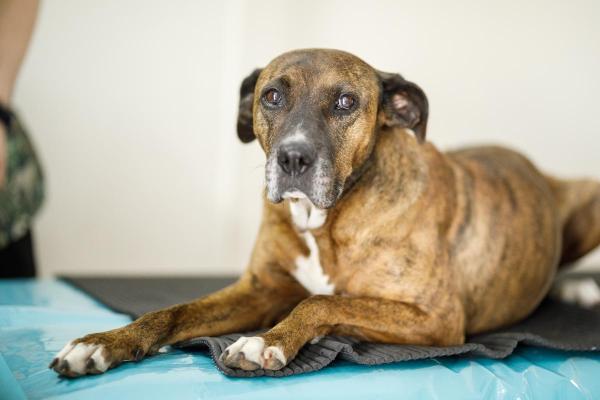
Is your older dog coughing more than usual? You're not alone. Coughing is one of the most common symptoms that worry pet parents with aging dogs. As our furry friends get older, their immune systems naturally weaken, just like their heart and lungs become less efficient. This makes them more vulnerable to developing conditions that often cause that persistent cough you might be noticing.
This AnimalWised article delves into why your senior dog might be coughing and gagging, and what treatment options are available.
1. Chronic bronchitis (COPD)
If your senior dog has a persistent cough that just won't go away, chronic bronchitis might be the culprit. This condition occurs when the bronchi, which are the airways connecting the windpipe to the lungs, become inflamed and stay that way.
Your senior pup might develop bronchitis for several reasons:
- Previous respiratory infections, like kennel cough that never fully resolved.
- Regular exposure to irritants in your home, such as air fresheners, cleaning products, or cigarette smoke.
- Age-related weakening of their immune system.
- Underlying heart problems putting pressure on the lungs.
- Seasonal or environmental allergies.
- A collapsing trachea, especially in small breeds.
You'll typically notice a persistent, dry cough that might sound like your dog is trying to clear their throat. The cough often gets worse with exercise or excitement, and might be accompanied by difficulty breathing or panting more than usual. Your dog might also exhibit wheezing or noisy breathing, show less energy or enthusiasm for walks and play, and occasionally gag, especially after coughing episodes.
Treatment options:
The good news is that bronchitis can often be managed effectively with proper veterinary care. Treatment typically includes anti-inflammatory medications to reduce airway swelling, along with bronchodilators that help open up the airways. If your vet suspects a bacterial infection has developed, they may prescribe antibiotics.
Environmental changes can make a big difference too, using a humidifier in dry weather and avoiding triggers like cigarette smoke, strong perfumes, or dusty environments can help your dog breathe easier.
[ltmbox id="D4qMtvFH" label="Click Here to Buy a Humidifier"]
2. Pneumonia
Pneumonia is another common reason your senior dog might be coughing. This lung infection can be particularly concerning in older dogs because their aging immune systems aren't as robust as they once were. Senior dogs who are already dealing with other health conditions or who are taking medications that suppress their immune system (like long-term steroids or chemotherapy) are especially vulnerable.
Pneumonia in senior dogs can develop from several different sources. Bacterial infections from organisms like E. coli or Streptococcus are common culprits. But also viral infections such as canine distemper or parainfluenza can lead to pneumonia, as can certain fungal infections like histoplasmosis.
If your senior dog has pneumonia, you'll likely notice a cough that sounds wet or productive, almost as if there's fluid or mucus involved. Your dog might also develop a fever, show signs of labored breathing, or seem unusually tired and reluctant to exercise.
You might notice nasal discharge or thick secretions from their nose, a decreased appetite, or in more severe cases, a bluish tint to their gums. This is a serious sign called cyanosis that indicates they're not getting enough oxygen.
Treatment options:
Treatment for pneumonia depends on what's causing it. Your veterinarian will likely recommend a course of antibiotics if they suspect a bacterial infection, or antifungal medications for fungal pneumonia. They may also prescribe anti-inflammatory drugs to reduce lung inflammation and bronchodilators to help your dog breathe more easily.
In more severe cases, your senior dog might need oxygen therapy at the veterinary hospital and intravenous fluids to maintain hydration. Your vet might also recommend nebulization and coupage, a technique that involves gently tapping your dog's chest to help loosen mucus, which you can learn to do at home.
Coughing in senior dogs can sometimes indicate more complex respiratory challenges. Learn how to identify different types of airway infections in our detailed exploration of canine respiratory health.

3. Congestive heart failure
Congestive heart failure is a condition that commonly develops in senior dogs when their aging heart can't pump blood efficiently anymore. This inefficiency causes fluid to back up and accumulate in the lungs or other parts of the body, what veterinarians call "congestion." When this fluid builds up in your dog's lungs, coughing is often one of the first signs you'll notice.
Several heart problems can lead to congestive heart failure in senior dogs. The most common is valvular disease, especially involving the mitral valve, which becomes leaky and less efficient with age. Some dogs develop dilated cardiomyopathy, where the heart muscle weakens and can't contract strongly enough. High blood pressure can damage blood vessels and heart valves over time, making heart failure more likely.
Other potential causes include heart rhythm abnormalities and congenital heart defects that may have been manageable when your dog was younger but become problematic with age.
The cough associated with heart failure tends to be persistent and often worsens at night or after physical activity. You might notice your dog struggling to breathe, losing weight despite a normal appetite, or becoming tired much more quickly during walks.
A particularly telling sign is a cough that starts as occasional but gradually becomes more frequent over weeks or months, often accompanied by decreased exercise tolerance.
Treatment options:
While congestive heart failure isn't curable, the good news is that with proper management, many dogs can maintain a good quality of life for quite some time. Your veterinarian will likely prescribe several medications to help manage the condition:
- ACE inhibitors to help relax blood vessels and improve blood flow.
- Diuretics to eliminate excess fluid from the lungs and other tissues.
- Medications that strengthen heart contractions.
- Drugs that dilate blood vessels to further reduce the heart's workload.
Your vet will likely recommend regular check-ups to monitor your dog's heart condition and adjust medications as needed.
4. Lung cancer
Lung cancer is another potential cause of coughing in dogs over ten years of age. Senior dogs are generally more susceptible to developing tumors compared to their younger counterparts. Lung cancer can be primary (originating in the lung tissue itself) or metastatic (spreading to the lungs from cancer elsewhere in the body).
While the exact causes of lung cancer in dogs aren't always clear, several risk factors may contribute:
- Age: senior dogs have a naturally higher risk of cancer development.
- Environmental factors: exposure to secondhand smoke, air pollution, or industrial chemicals.
- Genetic predisposition: some breeds may have a higher tendency toward certain cancers.
- Spread from other cancers: the lungs are a common site for cancer cells to spread from tumors elsewhere in the body.
Persistent coughing is one of the most characteristic signs of lung cancer in dogs. This cough may be dry or productive (with phlegm) and typically worsens over time. Other symptoms you might notice include difficulty breathing or shortness of breath, and rapid, shallow breathing sometimes accompanied by wheezing sounds.
Many dogs experience unexplained weight loss and decreased appetite, unusual fatigue or reluctance to exercise, and sometimes nasal discharge that may contain blood. General lethargy and depression are also common as the disease progresses.
It's important to note that these symptoms develop gradually, and by the time they're obvious, the cancer may be fairly advanced. That's why regular veterinary check-ups become increasingly important as your dog ages.
Treatment options:
Treatment for lung cancer in senior dogs depends on several factors, including the tumor's location and type, how advanced the disease is, and your dog's overall health. Your veterinarian may recommend surgery to remove the tumor if it's localized to one area and your dog is otherwise healthy enough for the procedure.
Chemotherapy might help control the spread of cancer and manage symptoms, especially in cases of metastatic lung cancer. Some types of lung tumors respond to radiation therapy, while in very advanced cases, the focus shifts to palliative care aimed at keeping your dog comfortable and maintaining quality of life for as long as possible.
Nutrition plays a vital role in supporting dogs diagnosed with cancer. Learn about specialized dietary strategies that can complement medical treatment in our detailed cancer nutrition guide for canines.

5. Tracheal collapse
Tracheal collapse could explain why your senior dog has developed a persistent cough, especially if they're a smaller breed. This condition occurs when the trachea (windpipe) loses its rigidity, causing it to flatten partially or completely, which affects your dog's ability to breathe normally. Since tracheal collapse is typically a progressive condition that worsens over time, it often becomes more noticeable as dogs enter their senior years.
Small breed dogs such as Pomeranians, Toy Poodles, Yorkshire Terriers, and Chihuahuas are genetically predisposed to tracheal collapse, but age can make the condition more apparent as the cartilage weakens further over time.
Obesity significantly increases the risk and severity, as excess fat puts additional pressure on the neck and chest area, affecting the already compromised trachea. Years of pulling against a collar rather than using a harness can also contribute to tracheal weakening in some dogs.
The most telling sign of tracheal collapse is a distinctive cough that many owners describe as sounding like a "goose honk." This dry, harsh cough typically becomes more pronounced when your dog is excited, during physical activity, or when pressure is applied to the collar area.
Treatment options:
For mild to moderate cases, your veterinarian may prescribe cough suppressants to reduce the frequency and severity of coughing episodes.
Bronchodilators can help improve breathing by relaxing and opening the airways. In some cases, anti-inflammatory medications may be prescribed to reduce irritation in the trachea, and antibiotics might be necessary if a secondary infection develops.
If your dog is overweight, a weight loss program can significantly improve symptoms by reducing pressure on the trachea. It's also essential to replace collars with a well-fitted harness that doesn't put pressure on the neck area.
For severe cases that don't respond well to medical management, surgical options exist to support the trachea with prosthetic rings or stents. However, surgery is typically considered only when the dog is otherwise healthy enough for the procedure and when quality of life is significantly impacted.
Want to ensure your loyal companion enjoys their golden years to the fullest? Our senior dog wellness guide covers everything from preventative healthcare to creating a comfortable environment for your aging pet.
This article is purely informative. AnimalWised does not have the authority to prescribe any veterinary treatment or create a diagnosis. We invite you to take your pet to the veterinarian if they are suffering from any condition or pain.
If you want to read similar articles to Why Is My Senior Dog Coughing and Gagging?, we recommend you visit our Breathing diseases category.
- Brooks, W. C. (2023). Chronic bronchitis in dogs. Veterinary Information Network (VIN). https://www.vin.com/apputil/content/defaultadv1.aspx?pId=11290&id=4252635
- American Veterinary Medical Association. (2023). Canine infectious respiratory disease complex (kennel cough). AVMA. https://www.avma.org/resources-tools/pet-owners/petcare/canine-infectious-respiratory-disease-complex-kennel-cough
- Cornell University College of Veterinary Medicine. (2022). Tracheal collapse. Riney Canine Health Center. https://www.vet.cornell.edu/departments-centers-and-institutes/riney-canine-health-center/canine-health-information/tracheal-collapse